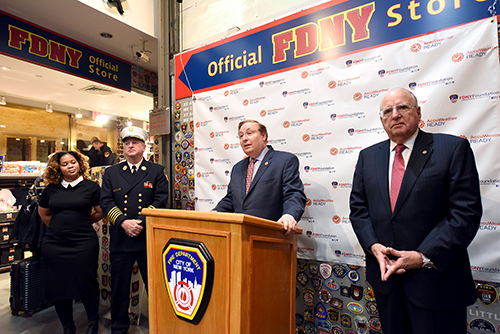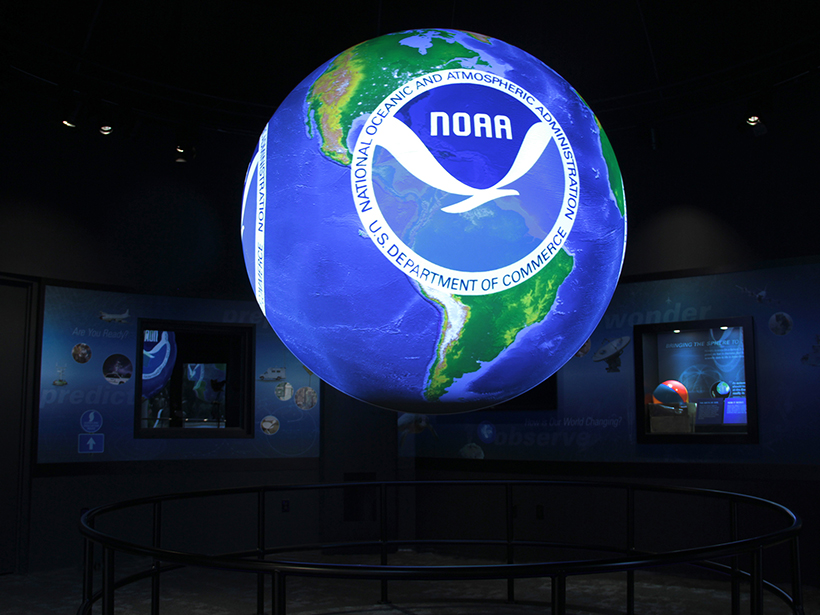President Donald Trump on Wednesday proposed Barry Myers as the next administrator of the National Oceanic and Atmospheric Administration (NOAA), an agency whose budget the administration has proposed slashing for fiscal year 2018.
Myers, who is chief executive officer of AccuWeather, Inc., would be just the second nonscientist nominated to lead NOAA since the formation of the agency in 1970. AccuWeather, headquartered in State College, Pa., is the world’s largest weather media company, reaching nearly 2 billion people daily, according to its website.
Some NOAA watchers applaud Myers’s background and understanding of weather issues. However, others said that his lack of science training and a potential for conflict of interest are red flags.
Myers has a law degree and a master’s degree in management science and organizational behavior. He has served as a special adviser to three directors of the National Weather Service, which is an office within NOAA; is a fellow of the American Meteorological Society; and has served on a NOAA Science Advisory Board working group. In addition to weather monitoring and prediction, NOAA has many other responsibilities, which include conducting research about and managing aspects of Earth’s atmosphere, oceans, and fish populations; conducting satellite observations of Earth and near space; monitoring and predicting space weather; and conducting climate research, evaluations, and forecasting.
In selecting Myers, Trump called him “one of the world’s leading authorities on the use of weather information.”
“Barry brings with him an outstanding record as a leader and manager as well as many years of experience in all aspects of meteorology. He is an ideal fit for the position at this time.”
Former NOAA administrator Conrad Lautenbacher told Eos, “I am very happy for both Barry and NOAA. Barry brings with him an outstanding record as a leader and manager as well as many years of experience in all aspects of meteorology. He is an ideal fit for the position at this time.”
“From my years of working with Barry, I know he appreciates the importance of reestablishing U.S. preeminence in weather prediction,” Antonio Busalacchi, president of the University Corporation for Atmospheric Research (UCAR), said in a statement released to Eos. “I look forward to hearing Barry’s plans to improve weather forecasting through partnerships among government agencies, private companies, and the university community. As we have seen from the recent hurricanes, timely and accurate forecasts are critical for evacuating residents and protecting lives and property, as well as strengthening our economy and safeguarding national security.” UCAR manages the National Center for Atmospheric Research in Boulder, Colo.

Myers, along with Timothy Gallaudet, who was confirmed recently as assistant secretary of commerce for oceans and atmosphere, “will bring fresh perspectives to the agency whose mission is to understand, predict, and share information about changes in climate, weather, ocean, and coasts and to manage and conserve our nation’s vast coastal and marine ecosystems and resources,” Jon White, president and CEO of the Consortium for Ocean Leadership, said in a statement. “Mr. Myers’ knowledge of the weather and climate enterprise will be complemented by Admiral Gallaudet’s extensive scientific and operational expertise in oceanography and meteorology. Their combined proficiency extends across the full spectrum of NOAA’s important missions from the deepest depths of the ocean to the heights of the atmosphere.”
Concerns Raised About Myers
Others, however, expressed concerns about Myers. Andrew Rosenberg, director of the Union of Concerned Scientists’ Center for Science and Democracy, told Eos that Myers “is a poor choice” to lead NOAA. Myers “is conflicted since he has advocated on behalf of his private company to take over some NOAA services. He is not really qualified, as he is not a scientist and has no experience with much of what NOAA does. That is a problem not only because there are so few appointees in this administration who have real science credentials but also because the NOAA scientific mission is evolving rapidly in all areas,” he said.
Myers’s lack of scientific background “perpetuates this administration’s utter disregard for science as a policy driver.”
Michael Conathan, director of ocean policy for the Center for American Progress, told Eos that “Myers’s lack of scientific background perpetuates this administration’s utter disregard for science as a policy driver.” He said that nominating someone “with no scientific background and no apparent understanding of oceans, fisheries, protected marine resources, coastal ecosystems, or any of the numerous other responsibilities the agency has is a clear indication of this administration’s priorities when it comes to oceans.”
Myers’s nomination “would present a host of conflicts of interests,” Richard Hirn, general counsel for the National Weather Service Employees Organization, told Eos. “As NOAA administrator, he would be in a position to fundamentally alter the nature of weather services that NOAA provides the nation, to the benefit of his family-owned business,” Hirn added. He said that in 2005, AccuWeather supported legislation introduced by then senator Rick Santorum (R-Pa.) that would have prohibited the National Weather Service from providing, with some exceptions, any product or service that is or could be provided by a private-sector weather company.
—Randy Showstack (@RandyShowstack), Staff Writer
Citation:
Showstack, R. (2017), White House will nominate AccuWeather’s Barry Myers to lead NOAA, Eos, 98, https://doi.org/10.1029/2017EO084801. Published on 12 October 2017.
Text © 2017. The authors. CC BY-NC-ND 3.0
Except where otherwise noted, images are subject to copyright. Any reuse without express permission from the copyright owner is prohibited.

